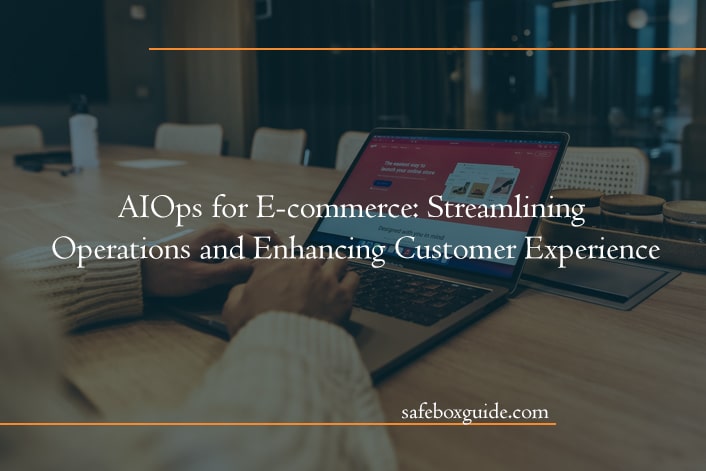As an e-commerce business owner, you know that managing your online store can be a formidable task. You’re constantly juggling multiple tasks like inventory management, order fulfillment, shipping, customer data management, and providing top-notch customer service. This means that you have little or no time to think about optimization or how your store is performing.
Enter AIOps – the latest buzzword in the tech industry, which has been gaining traction among e-commerce businesses for all the right reasons. AIOps can also help you with workflows that involve DevSecOps tools, such as accelerating deployment cycles and ensuring secure coding practices.

Contents
What is AIOps and Why is it Important for E-commerce Businesses?
AIOps stands for Artificial Intelligence for IT Operations, and it’s a quickly growing field that is revolutionizing how companies conduct their digital operations. AIOps platforms use machine learning and advanced algorithms to analyze data from various sources – including logs, metrics, and real-time feedback – to quickly and efficiently identify and respond to issues before they cause significant problems.
For e-commerce businesses, this is especially important. With so many moving parts – including website traffic, payment processing, shipping logistics, and customer service – it can be challenging to stay on top of everything and ensure your customers have a positive experience. AIOps can help you keep everything under control, giving you a better understanding of what’s happening behind the scenes and allowing you to make strategic decisions that can improve your operations and drive profits.
Advantages of Using AIOps for E-commerce Operations
The benefits of using AIOps for e-commerce businesses are numerous. Here are just a few of the ways that AIOps can help streamline your operations and enhance your customer experience:
- Improved Efficiency: By automating many tasks that traditionally require manual intervention, AIOps can significantly streamline your operations and reduce the time and resources required to manage your digital operations.
- Greater Visibility: AIOps platforms provide real-time insights into what’s happening behind the scenes, giving you a better understanding of what’s working and what isn’t. This can help you identify issues and respond to them quickly before they have a chance to impact your customers.
- Enhanced Customer Experience: By optimizing your operations and improving your visibility into customer behavior and preferences, AIOps can help you tailor your offerings to meet their needs better. This can result in higher customer satisfaction and increased loyalty.
How AIOps Can Help with Customer Experience Optimization
One of the key benefits of using AIOps for e-commerce operations is that it can help you optimize the customer experience from start to finish. Here are just a few ways that AIOps can help you accomplish this:
- Personalization: AIOps platforms can analyze customer behavior and preferences data to help you tailor your offerings to meet their needs better. This can include personalized recommendations, customized marketing messages, and more.
- Faster Response Times: By alerting you to potential issues in real time, AIOps can help you respond to customer inquiries and complaints more quickly, improving their overall experience with your brand.
- Smoother Checkout Process: By automatically identifying issues with your payment processing or checkout system, AIOps can help you reduce cart abandonment rates and ensure customers have a seamless purchasing experience.
Challenges Associated with AIOps Platform Adoption in E-commerce
While the benefits of using AIOps in e-commerce are clear, there are several challenges that businesses may face when it comes to adopting these platforms. Here are a few of the most common:
- Cost: Implementing an AIOps platform can be expensive, requiring significant investments in new technologies and staff training.
- Data Management: AIOps platforms rely on large amounts of data to identify patterns and make predictions. E-commerce businesses may need to invest in new data management tools or strategies to leverage AIOps effectively.
- Resistance to Change: As with any new technology, some employees may resist adopting AIOps platforms, preferring to stick with their existing methods and processes.

Best Practices for Deploying an Effective AIOps Strategy for E-commerce Businesses
If you’re considering implementing AIOps in your e-commerce business, here are a few best practices to keep in mind:
- Start Small: Don’t try to implement AIOps across your entire organization simultaneously. Start with a small pilot project and gradually expand it as you become more comfortable with the technology.
- Focus on Your Core Business: Make sure your AIOps platform is tailored to meet the specific needs of your business. Don’t focus too much on non-essential tasks or features that won’t help you achieve your goals.
- Invest in Training: Ensure that your staff are properly trained in using AIOps platforms, and provide ongoing support and guidance when needed.
- Monitor Performance: Regularly monitor the performance of your AIOps platform to ensure that it’s working as expected and make adjustments as necessary.

